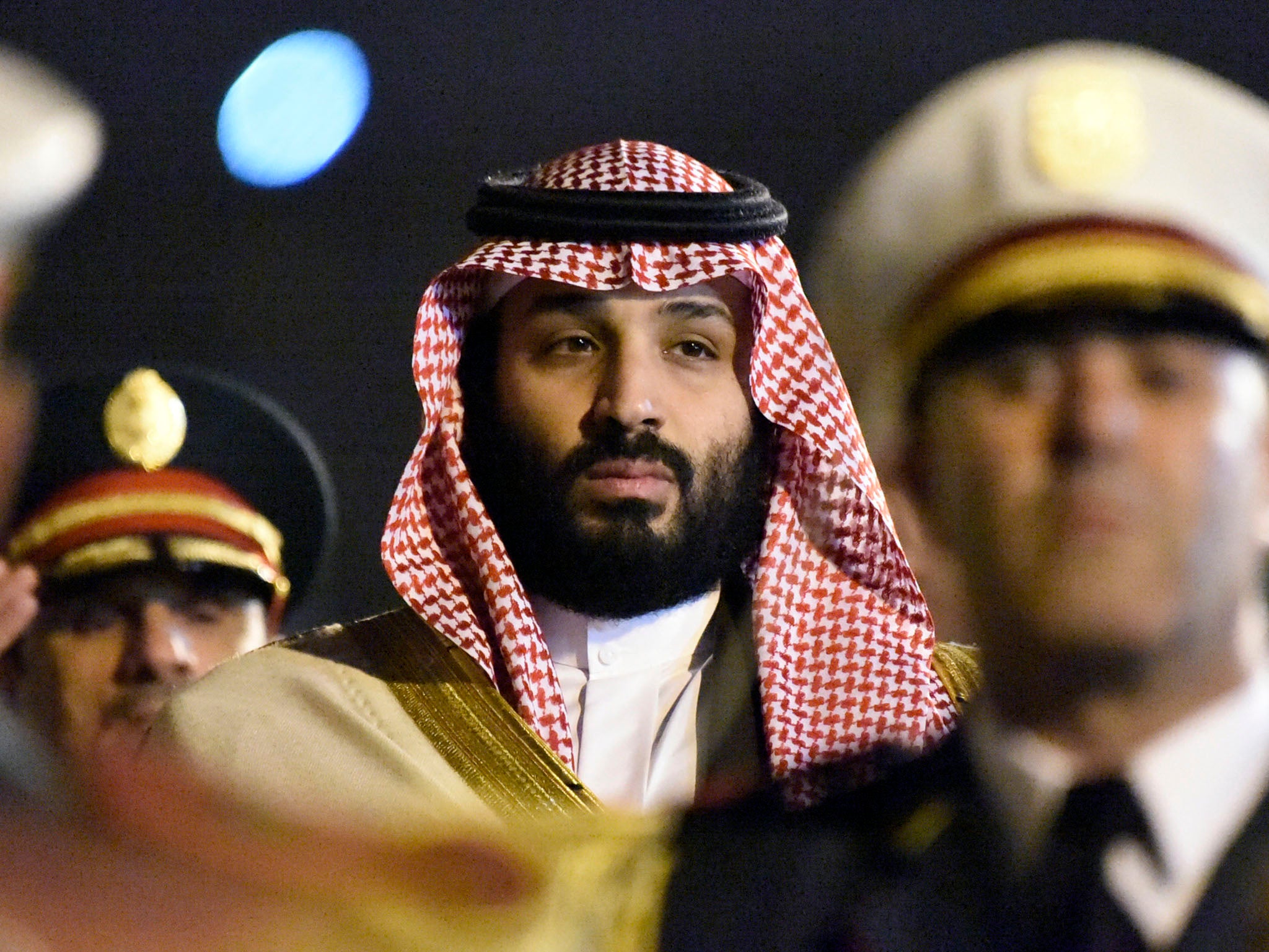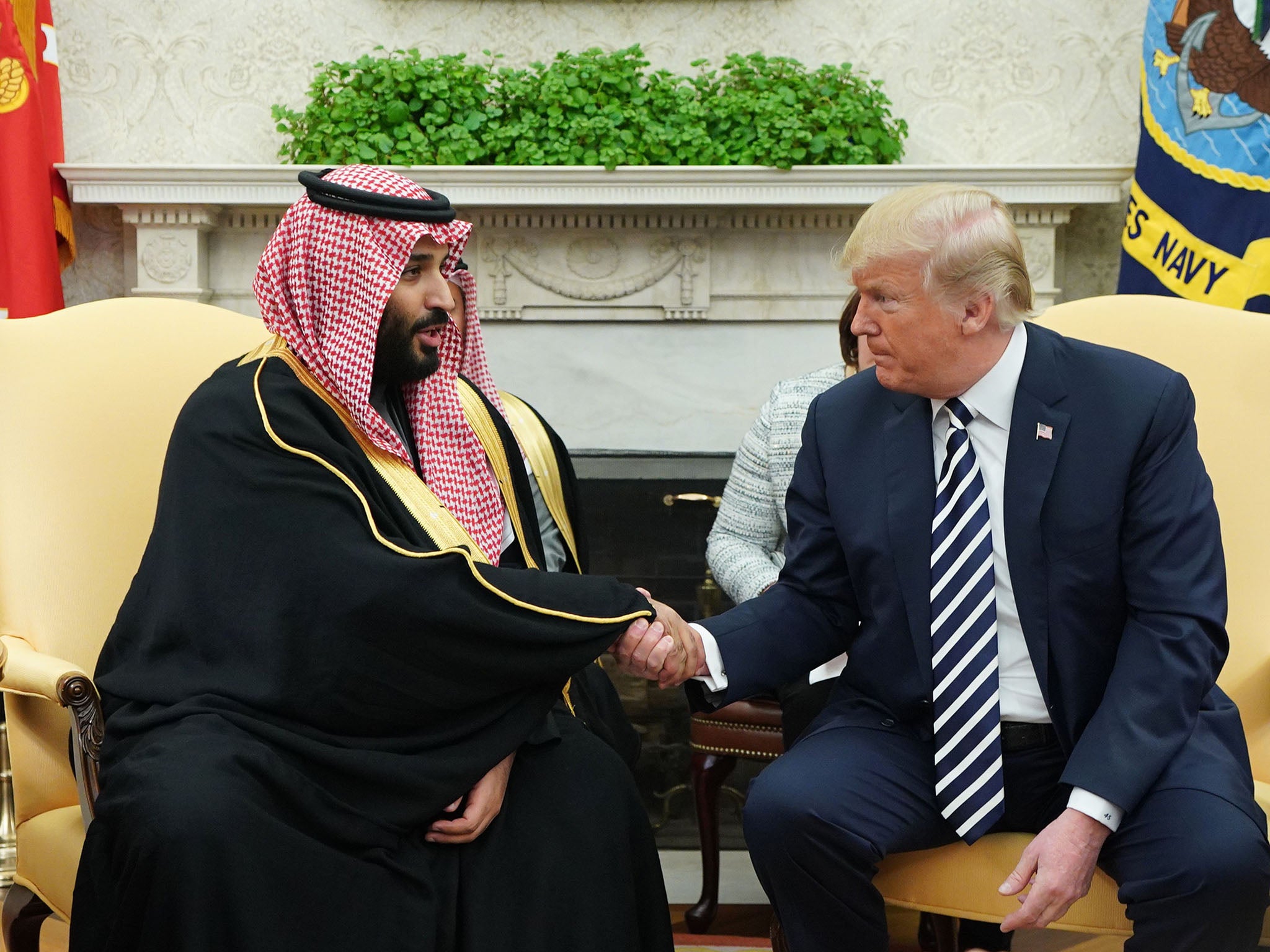Khashoggi was just one victim of many in Saudi prince’s campaign to silence dissenters
Crown Prince Mohammed bin Salman kidnapped, detained and tortured Saudi citizens for over a year before Jamal Khashoggi was killed, write Mark Mazzetti and Ben Hubbard

Crown Prince Mohammed bin Salman of Saudi Arabia authorised a secret campaign to silence dissenters – which included the surveillance, kidnapping, detention and torture of Saudi citizens – more than a year before the killing of Jamal Khashoggi, according to US officials who have read classified intelligence reports about the campaign.
At least some of the clandestine missions were carried out by members of the same team that killed and dismembered Khashoggi in Istanbul in October, suggesting that his killing was a particularly egregious part of a wider campaign to silence Saudi dissidents, according to the officials and associates of some of the Saudi victims.
Members of the team that killed Khashoggi, which US officials called the Saudi Rapid Intervention Group, were involved in at least a dozen operations starting in 2017, the officials said.
Some of the operations involved forcibly repatriating Saudis from other Arab countries and detaining and abusing prisoners in palaces belonging to the crown prince and his father, King Salman, the officials and associates said.
One of the Saudis detained by the group, a university lecturer in linguistics who wrote a blog about women in Saudi Arabia, tried to kill herself last year after being subjected to psychological torture, according to US intelligence reports and others briefed on her situation.
The rapid intervention team had been so busy that last June its leader asked a top adviser to Crown Prince Mohammed whether the crown prince would give the team bonuses for Eid al-Fitr, the holiday marking the end of Ramadan, according to US officials familiar with the intelligence reports.
Details about the operations come from US officials who have read classified intelligence assessments about the Saudi campaign, as well as from Saudis with direct knowledge of some of the operations. They spoke on the condition of anonymity for fear of repercussions from disclosing classified information or, in the case of the Saudis, from angering the Saudi government.
A spokesman for the Saudi embassy in Washington said the kingdom “takes any allegations of ill treatment of defendants awaiting trial or prisoners serving their sentences very seriously”.
Saudi laws prohibit torture and hold accountable those involved in such abuses of power, the spokesman said, and judges cannot accept confessions obtained under duress. The kingdom’s public prosecutor and the Saudi Human Rights Commission are investigating “recent allegations”, he said.
The Saudi government insists that the killing of Khashoggi – a dissident journalist living in the United States who wrote for The Washington Post – was not an assassination ordered from Riyadh. The decision to kill him was made by the team on the spot, government officials say, and those responsible are being prosecuted. Turkey and US intelligence agencies say the killing was premeditated.
The kingdom says that 11 Saudis are facing criminal charges for the killing and that prosecutors are seeking the death penalty for five of them, but officials have not publicly identified the accused.
After the killing of Khashoggi, Saudi officials acknowledged that the Saudi intelligence service had a standing order to bring dissidents home. What they did not acknowledge was that a specific team had been built to do it.
Saudi officials declined to confirm or deny that such a team existed, or answer questions about its work.

Saudi Arabia has a history of going after dissidents and other Saudi citizens abroad, but the crackdown escalated sharply after Mohammed bin Salman was elevated to crown prince in 2017, a period when he was moving quickly to consolidate power. He pushed aside Prince Mohammed bin Nayef, who oversaw the security services, giving the young prince sway over the intelligence agencies.
Since then, Saudi security forces have detained dozens of clerics, intellectuals and activists who were perceived to pose a threat, as well as people who had posted critical or sarcastic comments about the government on Twitter.
“We’ve never seen it on a scale like this,” said Bruce Riedel, a former CIA analyst now with the Brookings Institution. “A dissident like Jamal Khashoggi in the past wouldn’t have been considered worth the effort.”
Khashoggi was killed inside the Saudi consulate in Istanbul and dismembered with a bone saw. Turkey used surveillance video and audio recordings to uncover the crime, identify the team that carried it out and leak their names and photos to the news media.
Riedel said the team’s sloppiness showed that it was used to operating freely inside the kingdom and not under the watchful eye of an adversary’s intelligence service.
The Rapid Intervention Group was authorised by Crown Prince Mohammed and overseen by Saud al-Qahtani, a top aide whose official job was media czar at the royal court, US officials said. His deputy, Maher Abdulaziz Mutreb, an intelligence officer who has travelled abroad with the crown prince, led the team in the field.
Another operative on the team was Thaar Ghaleb al-Harbi, a member of the royal guard who was promoted in 2017 for valour during an attack on a palace of Crown Prince Mohammed’s.
Mutreb and al-Harbi are on trial in Riyadh for charges connected to Khashoggi’s death, a Saudi official said, while Qahtani is under house arrest, has been banned from travel and is under investigation, making it unclear whether the team is still operating.
US intelligence reports did not specify how involved Crown Prince Mohammed was with the group’s work, but said that the operatives saw al-Qahtani as a “conduit” to the prince.
When Crown Prince Mohammed locked hundreds of princes, businessmen and former officials in the Riyadh Ritz-Carlton in 2017 on accusations of corruption, al-Qahtani and Mutreb worked in the hotel, helping pressure detainees to sign over assets, according to associates of detainees who saw them.
Many of those detained at the Ritz were subject to physical abuse, and one died in custody, according to witnesses. It is not known whether members of the rapid intervention team were involved in the abuse. The Saudi government has denied that any physical abuse took place there.
But it was only after Khashoggi’s killing that the extent of the team’s work began to emerge. Mutreb and al-Harbi were both in the consulate when Khashoggi was killed, according to Turkish officials. US intelligence about the team’s previous operations informed the assessment by the CIA in November that Crown Prince Mohammed had ordered Khashoggi’s killing, US officials said.
The CIA declined to comment.
US intelligence agencies do not appear to have conclusive, smoking-gun proof that Crown Prince Mohammed ordering the killing, but they have pieced together a pattern of similar operations carried out by Saudi operatives under the prince’s authority.
The agencies continue to gather evidence about Crown Prince Mohammed’s role in the operations, and in December the National Security Agency produced a report saying that in 2017, the prince told a top aide that he would use “a bullet” on Khashoggi if he did not return to the kingdom and end his criticism of the government.
Intelligence analysts concluded that Crown Prince Mohammed may have not spoken literally – that he was not ordering Khashoggi to be shot – but that he intended to silence the journalist by killing him if the circumstances required it.

The CIA assessment has created tension between US spy agencies and President Donald Trump, who has made warm relations with the Saudis a cornerstone of his foreign policy. The crown prince has been a close ally of the Trump White House, especially Jared Kushner, the president’s son-in-law and senior adviser. Despite the CIA’s assessment that Crown Prince Mohammed ordered the operation, Trump has said repeatedly that the evidence was not conclusive.
The grisly killing of Khashoggi led to a storm of outrage in foreign capitals and a new scrutiny of the powerful crown prince, who had billed himself as a forward-thinking reformer with a grand vision to modernise the kingdom. But the journalist’s killing was just the latest in a string of clandestine operations against less high-profile Saudis, including members of the royal family.
US intelligence officials said that some of those detained in these operations were held at secret locations, including opulent palaces used by King Salman and his son, until November 2017, when many were moved to the compound surrounding the Riyadh Ritz-Carlton. At the time, the hotel was being used as a five-star jail in the kingdom’s anti-corruption campaign.
That crackdown became a cover for clandestine operations against Saudi dissidents, who were moved into detention in the Ritz at that time, according to US officials.
The Rapid Intervention Group also appears to have been involved in the detention and abuse of about a dozen women’s rights activists, who were detained last spring and summer. The activists, who had campaigned for lifting the kingdom’s ban on driving by women, included several well-known figures: Loujain al-Hathloul, who had been jailed for trying to drive her car into the kingdom from the United Arab Emirates; Aziza al-Yousef, a retired computer science professor; and Eman al-Nafjan, the linguistics lecturer.
At first, the women were not held in a prison, but were detained informally in what appeared to be an unused palace in the Red Sea port city of Jiddah, according to al-Hathloul’s sister, Alia. Each woman was locked in a small room, and the windows were covered. Some of the women were frequently taken downstairs for interrogation, which included beatings, electric shocks, waterboarding and threats of rape and murder.
In an op-ed article for The New York Times, Alia al-Hathloul wrote that al-Qahtani was “present several times” when her sister was tortured, and that he threatened to kill her and throw her body in the sewer.
The treatment was so harsh that al-Nafjan tried to commit suicide, according to a US intelligence assessment.
The women were later moved to the Dhahban Prison in Jeddah, where the physical abuse stopped and their relatives were allowed to visit, al-Hathloul said.
Their trial opened in Riyadh on 13 March, but journalists and diplomats were not permitted to attend, and the government did not announce the charges against them.
The Saudi official said that al-Hathloul, al-Yousef and al-Nafjan were being tried “in connection with activities that threatened the kingdom’s national security”.
In the kingdom’s effort to forcibly repatriate Saudi citizens living abroad, it was not always clear which operations were carried out by the rapid intervention team and which by other parts of the security services.
At least one Saudi who was detained in the Ritz and accused of corruption, Rami al-Naimi, a son of a former Saudi oil minister, was forcibly repatriated from the United Arab Emirates in November 2017. An associate of a senior member of the royal family, Faisal al-Jarba, was snatched in a midnight raid on an apartment in Jordan last June and returned to Saudi Arabia. His family has struggled to get information on where he is or why he is being held.
In August 2017, a minor prince, Saud bin al-Muntasir bin Saud, was sent back to the kingdom from Morocco. Last May, a university student who had dual Saudi-Qatari citizenship was arrested during a visit to Kuwait and sent home.

© New York Times
Join our commenting forum
Join thought-provoking conversations, follow other Independent readers and see their replies
Comments
Bookmark popover
Removed from bookmarks